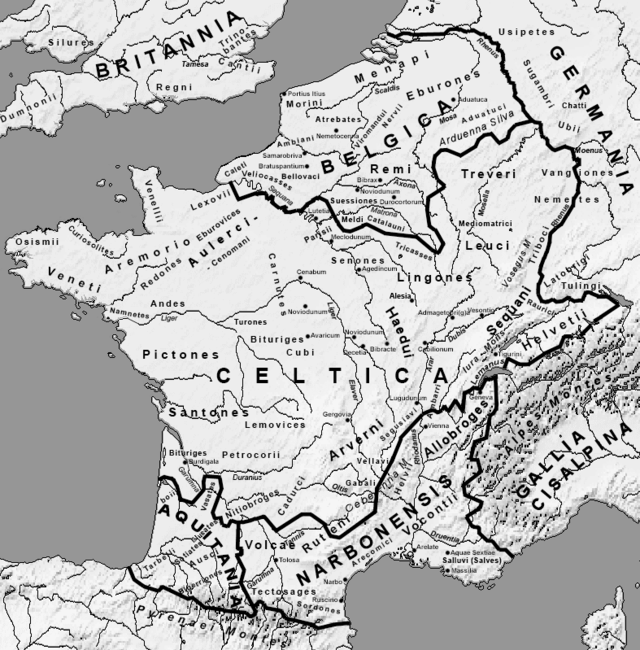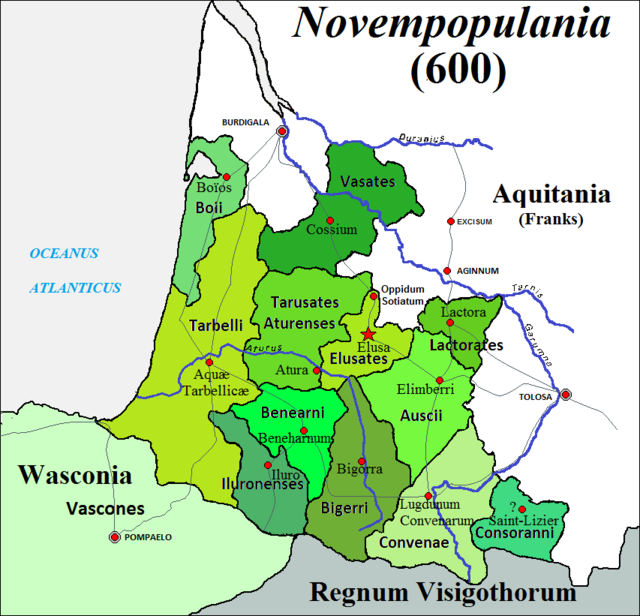Loading AI tools
Ancient group of non Indo-European peoples from present-day France From Wikipedia, the free encyclopedia
The Aquitani were a tribe that lived in the region between the Pyrenees, the Atlantic Ocean, and the Garonne, in present-day southwestern France[1] in the 1st century BC. The Romans dubbed this region Gallia Aquitania. Classical authors such as Julius Caesar and Strabo clearly distinguish the Aquitani from the other peoples of Gaul, and note their similarity to others in the Iberian Peninsula.

Their old language, the Aquitanian language, was a precursor of the Basque language[2] and the substrate for the Gascon language (one of the Romance languages) spoken in Gascony. Between the 1st century and the 13th century, the Aquitani gradually adopted the Gascon language while part of the Roman Empire, then the Duchy of Gascony and the Duchy of Aquitaine.
At the time of the Roman conquest, Julius Caesar, who defeated them in his campaign in Gaul, describes them as making up a distinct part of Gaul:
All Gaul is divided into three parts, one of which the Belgae inhabit, the Aquitani another, those who in their own language are called Celts, in ours Gauls, the third. All these differ from each other in language, customs and laws. The river Garonne separates the Gauls from the Aquitani[3]
Despite apparent cultural and linguistic connections to (Vascones), the region of Aquitania extended only to the Pyrenees according to Caesar:
Aquitania extends from the river Garonne to the Pyrenaean mountains and to that part of the ocean which is near Hispania: it looks between the setting of the sun, and the north star.[4]
Late Romano-Aquitanian funerary slabs and altars contain what seem to be the names of deities or people similar to certain names in modern Basque, which has led many philologists and linguists to conclude that Aquitanian was closely related to an older form of Basque. Julius Caesar draws a clear line between the Aquitani, living in present-day south-western France and speaking Aquitanian, and their neighboring Celts living to the north.[2] The fact that the region was known as the Vasconia in the Early Middle Ages, a name that evolved into the better known form of Gascony, along with other toponymic evidence, seems to corroborate that assumption.


Although the region where the original Aquitanians lived came to be named Novempopulania (nine peoples) in the late years of the Roman Empire and Early Middle Ages (up to the 6th century), the number of tribes varied (about 20 for Strabo, but comparing with the information of other classical authors such as Pliny, Ptolemy and Julius Caesar, the total number were 32 or 33):[citation needed]
In the southern slopes of western Pyrenees Mountains, not in Aquitania but in northern Hispania Tarraconensis:
Seamless Wikipedia browsing. On steroids.
Every time you click a link to Wikipedia, Wiktionary or Wikiquote in your browser's search results, it will show the modern Wikiwand interface.
Wikiwand extension is a five stars, simple, with minimum permission required to keep your browsing private, safe and transparent.